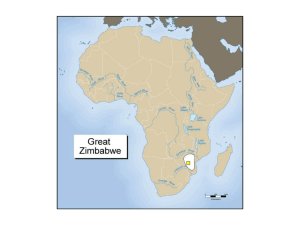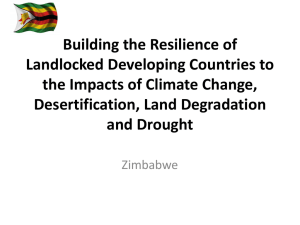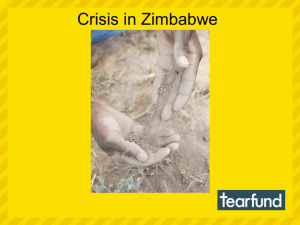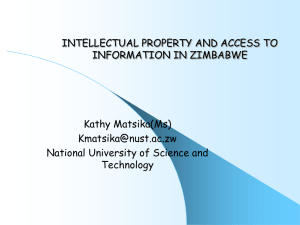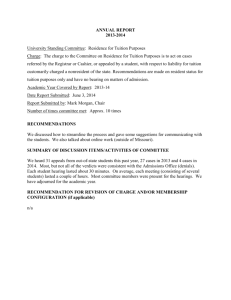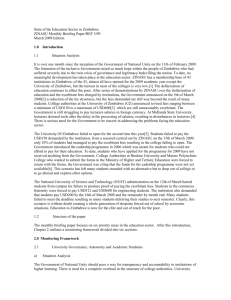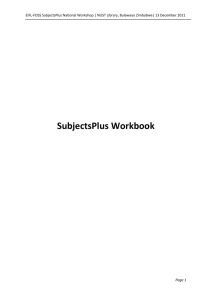Word 97 - The Kubatana Archive Site
advertisement
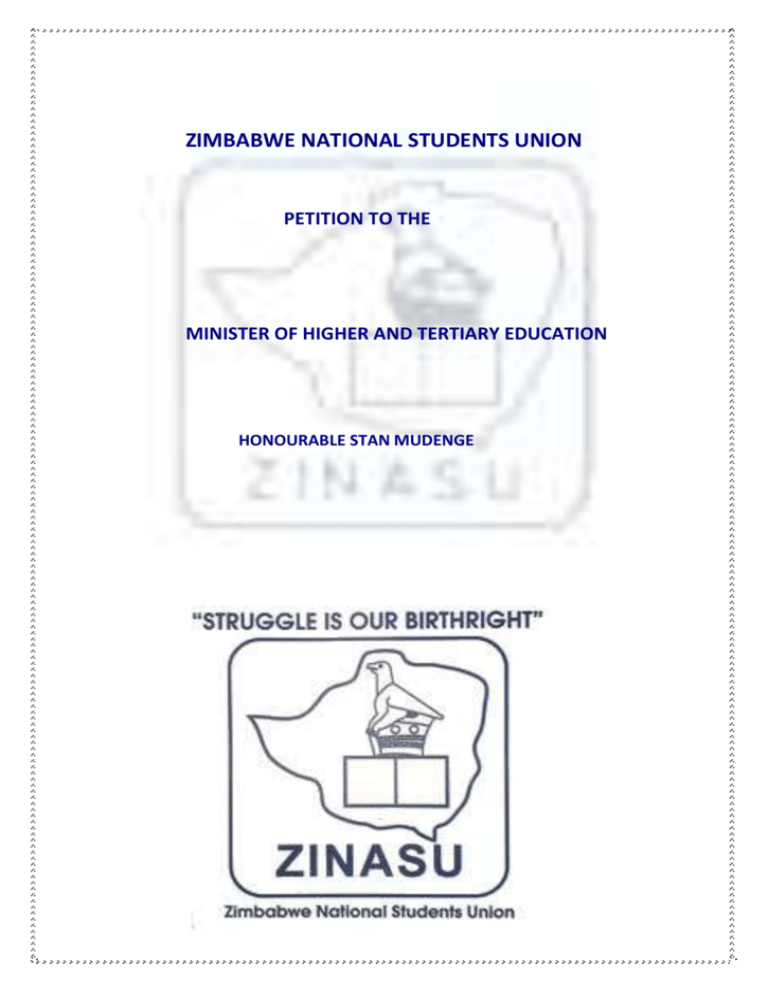
ZIMBABWE NATIONAL STUDENTS UNION PETITION TO THE MINISTER OF HIGHER AND TERTIARY EDUCATION HONOURABLE STAN MUDENGE We the students from Zimbabwe’s institutions of higher learning, Recalling the historic inception of the inclusive government on the 13th of February 2009, this brought about a stable political environment, conducive for the recovery of the economy and education in particular. Considering the Short Term Emergency Recovery Programme (STERP), unveiled on 19 March 2009, where the inclusive government placed education at the centre of its economic and social policies. Also considering the undertaking that the Ministry of Higher and Tertiary Education made in the Second hundred day plan to improve the education sector by the 26th of August 2009. Realising the static ramshackle state of higher education, seven months after the formation of the inclusive government, and that developments proposed to be done on paper have not yet been implemented on the ground. We hereby bring to the attention of the Honourable Minister of Higher and Tertiary Education Dr Stan Mudenge, the following issues: TUITION AND ACCOMMODATION FEES Tuition fees in Universities are ranging from USD400 to USD700, in Poly-technic and teachers colleges they are ranging from USD150 to USD 400. These fees are exorbitant and beyond the reach of the majority who are supported by peasants and civil servants. Students who cannot afford the fees are being deferred in almost all institutions such as NUST and GZU. The cadetship scheme which is meant to cushion those who cannot afford to pay fees has not yet assisted students, as it is reportedly said that government has no money. Accommodation fees are ranging from USD300-USD600; these are also unaffordable by the majority. Physical accessibility to institutions of higher learning is a right of every student thus the need to make campus accommodation affordable by all. Students at Teachers and Poly-technic colleges are required to pay centre fees before sitting for examinations which is unreasonable as they are registered students at those institutions. Centre fees have always been charged to external students. Student teachers are receiving a poultry allowance of USD... during Teaching Practice, which is far below the poverty datum line and cannot sustain them; furthermore they are required to pay tuition fees. Students at Morgenster Teachers College were forced to return for teaching practice after they failed to pay assessment fees of USD120. ACADEMIC FREEDOMS Restrictive laws are still being used against students for example the University of Zimbabwe Act, which allows for the dissolution of the students union by the Vice Chancellor and the suspension of student leaders. Disciplinary committees are not respecting the students’ right to a fair hearing within a reasonable time. There is no adequate and clear protection of female and disabled students by the laws and Defending academic freedoms in Zimbabwe Ordinances. Institutions are failing to respect and recognise the role of Student Representative Councils (SRC), they are also not conducting SRC elections. TEACHING AND LEARNING MATERIALS There is a massive shortage of teaching and learning materials in all institutions due to inadequate funding by government. Technological equipment such as computers, projectors, internet, photocopiers, printers, science laboratory equipment is either outdated or not available. Most institutions do not have the special academic equipment required by disabled students, thus impairing their access to the right to education. Since government is not financially assisting students they cannot afford to buy the required academic material, as they already have a financial burden of paying tuition and accommodation fees. Libraries are inadequately stocked and have outdated books. The curriculum is also outdated and inconsistent with the needs of the technologically advanced world. ACADEMIC PERSONNEL Qualified and experienced lecturers who once constituted the staff of institutions of higher learning left the service at the height of the economic crisis in Zimbabwe, because of poor working conditions. The situation improved but not enough to attract back the qualified staff, which is critical in delivering quality education. Institutions are heavily infested by inexperienced and part- time academic personnel. HEALTH AND SOCIAL WELFARE Campus clinics don’t have resident doctors and medical supplies. Students cannot afford the compulsory medical aid fee being charged which ranges from USD5 to USD20. The clinics do not provide ante and post natal care for pregnant students. The Students Union is barred for carrying out social events such as concerts and debates on campus. ACADEMIC INFRASTRUCTURE Infrastructure such as lecture theatres, libraries and halls of residence in all institutions is in a dilapidated state and in dire need of renovations. UZ halls of residence are closed as they are in an inhabitable state, students at GZU are still sharing premises with Masvingo Poly-technic, and the NUST library is still incomplete. The infrastructure in most institutions is not user friendly for disabled students. Conscious of the suffering of students in institutions of higher learning and bearing in mind so many students who dropped out of college or had their studies deferred due to the exorbitant fees Convinced that it is the duty and international obligation of the state to provide quality and affordable education to all citizens rich or poor, WE HEREBY STATE OUR DEMANDS: 1. Tuition fees must be slashed to affordable levels ranging between USD20USD100 2. Government must re-introduce student grants and medical aid scheme for students 3. Working conditions of lecturers must be improved Defending academic freedoms in Zimbabwe 4. The repeal of restrictive provisions in University and College laws 5. Government must increase the budgetary allocation to the Ministry of Higher and Tertiary Education 6. Renovation of academic infrastructure in all institutions and opening of UZ Halls of Residence 7. The respect and recognition of college Student Representative Councils in all institutions 8. Gender sensitive laws and Ordinances 9. Respect and protection of the rights of disabled students 10. Increase of student teachers allowances Defending academic freedoms in Zimbabwe

